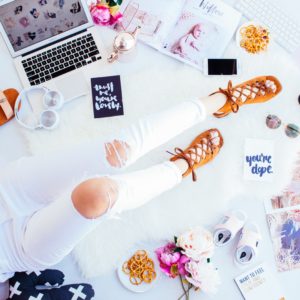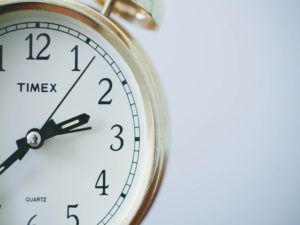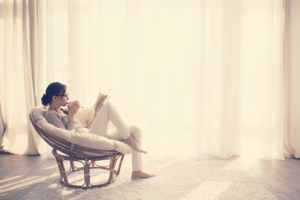Why does mess lead to so much stress?
Over-stimulation
Lots of physical possessions in homes bombard people. Much like a baby who feels overwhelmed with all the colour and noise of a large array of toys and instead chooses to play with a simple cardboard box, the senses can become overloaded and a longing for simplicity prevails.
Distraction
Clutter also distracts and steals the focus away from what is most important. That could manifest itself in owning too many craft materials so that a beautiful piece is lost or ignored. Or too many social engagements could mean that the most important people in your life are not given sufficient time and energy.
Overwhelm
Is it even possible to relax at the end of the day in in a cluttered home? Surely this environment would send signals to the brain that there is still work to do? And create anxiety because it feels like such a huge mountain to climb. Or thinking of it in terms of over-committing; when too many plates are kept spinning, it’s inevitable that some or all of them will fall. That’s when people let others down, then feel guilty for not living up to expectations.
Time Stealing
Lost time spent searching for misplaced possessions is very common. Time is the most precious commodity people have and it is such a waste to spend it in this way.
Money Pinching
Clutter costs money- no doubt about it. It’s very common to buy a duplicate if a possession is misplaced. I also regularly see people buy more possessions to make themselves feel better about living in a cluttered home.
Shame
Possibly the most insidious cost of clutter is the guilt and embarrassment it can bring upon people. This may be cause a reluctance to invite others into the home, or anxiety when people drop by unannounced.
Key to contentment?
Think about how you feel when you go on holiday and enter that hotel room for the first time. You have left both the physical and emotional clutter at home. You are in a calm, clutter-free space and you have taken with you only what you need. It feels freeing and you breathe a sigh of relief. Maybe the physical environment is a key factor! There is research that clutter and disorder is detrimental to mental health. Having too much can create an empty feeling. However, when you allow yourself limited purchases, suddenly each one becomes so much more special. And more appreciated.
Brain Health
And perhaps order feels good, in part because in a decluttered space your brain doesn’t have to work so hard. This leaves you feeling calm and energised. Even before thinking about the knock on benefits, by its very nature, losing the clutter has a positive effect on your brain.
Money Saver
And if you’re in the situation where you can’t afford all our belongings? (as is the case if they have been acquired on credit or if you have to go without something else you need) Surely then the joy they give you is going to be diminished?
Health Implications
The state of our homes doesn’t just impact our minds and mental health; it also affects us in a physical sense. Clutter can cause physical accidents (tripping over that stuff on the stairs!) Or attract dust which aggrevates asthma and allergies.
Mental Clutter
The premise extends beyond physical objects of course. It’s easy to overfill lives with the wrong people and past times too. Spending time on something that enhances life in some way is the ultimate formula for contentment.
Perhaps what it boils down to is that stuff can be distracting and more so the more you have. So, you might be aware of your priorities and goals in life. But the road to achieving them may be long and require commitment and determination. Ultimately though, the sense of achievement and satisfaction would be well worth the hard work. On the other hand, it’s easy to be tempted by what you see online, in publications or (most luring of all) what you see your peers acquire. It’s often just clever marketing though and chances are, most of it won’t help you achieve your goals; it could even hinder you by stealing your attention, time and money.
“Happiness can only be found if you free yourself from other distractions” Saul Bellow
Thanks so much for reading
A Tidy Mind



